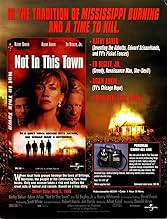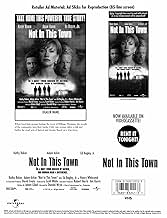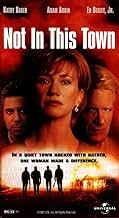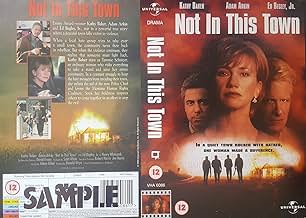अपनी भाषा में प्लॉट जोड़ेंWhen local hate groups besiege the town of Billings, Montana, the people of the community turn their backs. Only one woman takes a risk and battles the cruel acts of hatred and racism.When local hate groups besiege the town of Billings, Montana, the people of the community turn their backs. Only one woman takes a risk and battles the cruel acts of hatred and racism.When local hate groups besiege the town of Billings, Montana, the people of the community turn their backs. Only one woman takes a risk and battles the cruel acts of hatred and racism.
Max Gail
- Wayne Inman
- (as Max Gail Jr.)
फ़ीचर्ड समीक्षाएं
This TVM takes it upon itself to inform the world what a terrible thing racism is . I had to stop myself from bowing down in front of the TV screen in praise and I'm sure that millions of people who have watched this on late night television are eternally grateful for being told that racism is a terrible thing . Oh yes I'm being sarcastic
The " true " story revolves around Tammy and Brian Schnitzer a Jewish couple who move into a town full of red necks . I said " true " story because I felt this TVM may take a few liberties as to how true things were . Okay it's a TVM which means the television company can't show or say things that would be offensive ( Notice graffiti doesn't contain the F word ) meaning three dimensional racist characters are going to be thin on the ground but the script makes them ridiculous caricatures and we're treated to ridiculous scenes where the racists go into a church and light a cigarette which leads to the black congregation to sing a song containing the lyric " Oh burn me down Lord " and the racists retreat at the fairly impressive chorus line and dancing . As I said ridiculous and this leads to more questions and answers
Racists smoke ? I thought neo Nazis were anti drink and smoking , but it's never revealed if the racists are neo Nazis or plain ignorant racists
Black people are good singers and dancers because they've got rhythm ? Inverse racism on the part of the producers is it not ?
Why is a church exclusively full of black people . Ah well that's because in certain American states churches are segregated something the producers only hint at . No doubt they didn't want to cause offence or start a debate
If you want a film featuring mans inhumanity to man try SCHINDLERS LIST or THE KILLING FIELDS
The " true " story revolves around Tammy and Brian Schnitzer a Jewish couple who move into a town full of red necks . I said " true " story because I felt this TVM may take a few liberties as to how true things were . Okay it's a TVM which means the television company can't show or say things that would be offensive ( Notice graffiti doesn't contain the F word ) meaning three dimensional racist characters are going to be thin on the ground but the script makes them ridiculous caricatures and we're treated to ridiculous scenes where the racists go into a church and light a cigarette which leads to the black congregation to sing a song containing the lyric " Oh burn me down Lord " and the racists retreat at the fairly impressive chorus line and dancing . As I said ridiculous and this leads to more questions and answers
Racists smoke ? I thought neo Nazis were anti drink and smoking , but it's never revealed if the racists are neo Nazis or plain ignorant racists
Black people are good singers and dancers because they've got rhythm ? Inverse racism on the part of the producers is it not ?
Why is a church exclusively full of black people . Ah well that's because in certain American states churches are segregated something the producers only hint at . No doubt they didn't want to cause offence or start a debate
If you want a film featuring mans inhumanity to man try SCHINDLERS LIST or THE KILLING FIELDS
Something like this actually happened in Billings. Or -- I should put "something like this" in quotes because I doubt that the actual events were so thoroughly and theatrically scripted.
Montana gets a bad rep. Outisders tend to think of it as a lunatic asylum to which everyone who wants to "get off the grid" in order to oppose The New World Order (by which they seem to mean mainly Pakistani UN troops) migrates. I worked for the Indian Health Service in Billings for one summer, a few years before this incident, and found it a decent place, a lot more accomodating than any similar-sized city in, say, New Jersey. And you can find a decent pizza and get the New York Times at the airport, and they have a Montessori School -- so what do you want, egg in your beer?
We see a lot of hatred shown towards minorities -- Indians, blacks, and especially Jews. And we see the family at the center of all this turmoil, a nice Jewish doctor with a nice ex-Lutheran wife and their child. Some minor conflicts are built into the story in expectable ways. "If we ignore it, maybe it will go away." "But that's what they said in the Old Country." That sort of thing. We see some minor conflicts in the community too, although some of them are not too plausible. (Should the hospital administrator allow the refugees from a bomb-threatend Temple to take shelter in his lobby, or would the presence of so many Jews all at once alienate someone or put the hospital at risk or taint the air with the aroma of sweet and sour short ribs?) The bad guys are really BAD. You can tell because they're always smoking cigarettes. There is never a moment when the viewer is allowed the slightest doubt about the "right thing to do."
And that's too bad because this is an issue worth exploring. Will a normal loving middle-class community always have to put up with hate mongers? Is there a good reason why there has never been a human society free of internal conflict? Does goodness generate its opposite? Or, to put it differently, does a "thesis" always produce its own "antithesis", as Hegel argued? If so, why? The movie gives us no idea of the social dynamics involved in this confrontation between good and evil. The bad guys are outsiders and speak ungrammatically and are given lines like "this country belongs to White Christians," but we haven't the slightest notion of why they've been made to believe such baloney. It's not enough to dismiss them, as the doctor does, as "psychopaths." (Not too enlightening, Doc.)
It's a touching and interesting story and it's kind of dumbed down for people who might not get the point. At a meeting in the Temple, an old Jewish woman gets several minutes to tell the kind of heartbreaking story about having survived the Nazi genocide that the viewer is already familiar with. On top of that, when everyone is hustled outside into a rainstorm my the police, she seems about to faint so that people must rush to her side and help her. PLEASE! We get it, already.
Still, I don't want to hit this film with a sledgehammer. If I find it irritating, it's not just because of the way it's been executed but because of all the missed opportunities. For instance, is it possible that, for whatever reasons, some minorities willingly contribute to their own marginality. How do Jews, blacks, and Indians feel about the rising popularity of intergroups marriages? Conservative White Christians used to ask liberals, "Would you want your daughter to marry one?" Now that sort of objection is as likely to come from the minority group that does not want to lose its solidarity, its identity, its separateness.
The issue the movie deals with has to do with the heart of human nature, and it treats it like a soap opera with a happy ending.
Montana gets a bad rep. Outisders tend to think of it as a lunatic asylum to which everyone who wants to "get off the grid" in order to oppose The New World Order (by which they seem to mean mainly Pakistani UN troops) migrates. I worked for the Indian Health Service in Billings for one summer, a few years before this incident, and found it a decent place, a lot more accomodating than any similar-sized city in, say, New Jersey. And you can find a decent pizza and get the New York Times at the airport, and they have a Montessori School -- so what do you want, egg in your beer?
We see a lot of hatred shown towards minorities -- Indians, blacks, and especially Jews. And we see the family at the center of all this turmoil, a nice Jewish doctor with a nice ex-Lutheran wife and their child. Some minor conflicts are built into the story in expectable ways. "If we ignore it, maybe it will go away." "But that's what they said in the Old Country." That sort of thing. We see some minor conflicts in the community too, although some of them are not too plausible. (Should the hospital administrator allow the refugees from a bomb-threatend Temple to take shelter in his lobby, or would the presence of so many Jews all at once alienate someone or put the hospital at risk or taint the air with the aroma of sweet and sour short ribs?) The bad guys are really BAD. You can tell because they're always smoking cigarettes. There is never a moment when the viewer is allowed the slightest doubt about the "right thing to do."
And that's too bad because this is an issue worth exploring. Will a normal loving middle-class community always have to put up with hate mongers? Is there a good reason why there has never been a human society free of internal conflict? Does goodness generate its opposite? Or, to put it differently, does a "thesis" always produce its own "antithesis", as Hegel argued? If so, why? The movie gives us no idea of the social dynamics involved in this confrontation between good and evil. The bad guys are outsiders and speak ungrammatically and are given lines like "this country belongs to White Christians," but we haven't the slightest notion of why they've been made to believe such baloney. It's not enough to dismiss them, as the doctor does, as "psychopaths." (Not too enlightening, Doc.)
It's a touching and interesting story and it's kind of dumbed down for people who might not get the point. At a meeting in the Temple, an old Jewish woman gets several minutes to tell the kind of heartbreaking story about having survived the Nazi genocide that the viewer is already familiar with. On top of that, when everyone is hustled outside into a rainstorm my the police, she seems about to faint so that people must rush to her side and help her. PLEASE! We get it, already.
Still, I don't want to hit this film with a sledgehammer. If I find it irritating, it's not just because of the way it's been executed but because of all the missed opportunities. For instance, is it possible that, for whatever reasons, some minorities willingly contribute to their own marginality. How do Jews, blacks, and Indians feel about the rising popularity of intergroups marriages? Conservative White Christians used to ask liberals, "Would you want your daughter to marry one?" Now that sort of objection is as likely to come from the minority group that does not want to lose its solidarity, its identity, its separateness.
The issue the movie deals with has to do with the heart of human nature, and it treats it like a soap opera with a happy ending.
10BBB-7
Should be aired more frequently and in prime time.
People in all societies should be more aware of hate crimes and the reality that they can happen anywhere to anyone.
People in all societies should be more aware of hate crimes and the reality that they can happen anywhere to anyone.
And Adam Arkin again delivers a very good performance in this film about racism and bigotry.
Based on the true story of Tammy and Eliot Scnitzer, we have seen the story before, but it is well-presented here. The scene in the church is a bit heavy-handed, as the people are singing "Lay my burdens down Lord", and the racist group backs down. Actually they were probably such cowards that they did all their vandalism late at night, anyway.
More recent films, such as "American History X" (Ed Norton) are extremely disturbing, and (for me anyway) a bit too violent to watch. Yes, we do need to know these issues exist. At least this movie does not have gratuitous violence and rape, and yes it should be shown more often on prime time TV.
The Ed Begley character (as Henry Whitcomb) is a white supremacist who seemingly recruits groups in the Billings, Montana area. At the end he tells the ineffectual racist cowards they have failed. People are now putting menorahs in the window, the newspaper has helped the community; people are now willing to fight back, which defeats the group. Ed Begley has a thankless role here (His father also portrayed the bigot in "12 Angry Men"). All in all this is a good film which deals with an important subject. 9/10.
Based on the true story of Tammy and Eliot Scnitzer, we have seen the story before, but it is well-presented here. The scene in the church is a bit heavy-handed, as the people are singing "Lay my burdens down Lord", and the racist group backs down. Actually they were probably such cowards that they did all their vandalism late at night, anyway.
More recent films, such as "American History X" (Ed Norton) are extremely disturbing, and (for me anyway) a bit too violent to watch. Yes, we do need to know these issues exist. At least this movie does not have gratuitous violence and rape, and yes it should be shown more often on prime time TV.
The Ed Begley character (as Henry Whitcomb) is a white supremacist who seemingly recruits groups in the Billings, Montana area. At the end he tells the ineffectual racist cowards they have failed. People are now putting menorahs in the window, the newspaper has helped the community; people are now willing to fight back, which defeats the group. Ed Begley has a thankless role here (His father also portrayed the bigot in "12 Angry Men"). All in all this is a good film which deals with an important subject. 9/10.
Showed there was some risk of retribution if you are among the first to protest bigotry. That is, the first people to put up "no hate" signs were themselves made targets. Ed Begley's character was portrayed as very smooth. What he said seemed reasonable to appeal to people who were unemployed and who were not out and out bigots. The fact that it was based on a true story gave it credibility that a community can come together to fight a problem. Same thing could apply to combat street gangs or drug dealers in your neighborhood. The fact that the grandmother pulled back because her granddaughter had changed her religion is the same thing that happens when a child comes out as a homosexual in many cases.
क्या आपको पता है
- ट्रिवियाLeads Kathy Baker, Adam Arkin, and Ed Begley Jr. are all best-known for playing TV doctors on the shows "Picket Fences", "Chicago Hope" and "St. Elsewhere", respectively. Both "Picket Fences" and "Chicago Hope" were created by David E. Kelley.
टॉप पसंद
रेटिंग देने के लिए साइन-इन करें और वैयक्तिकृत सुझावों के लिए वॉचलिस्ट करें
विवरण
इस पेज में योगदान दें
किसी बदलाव का सुझाव दें या अनुपलब्ध कॉन्टेंट जोड़ें












